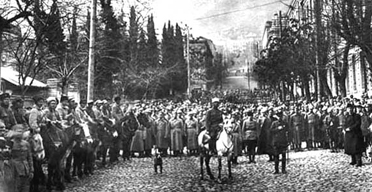Georgia Marks 1921 Red Army Invasion

| The Bolsheviks Red Army in Tbilisi, February, 1921. Photo: courtesy of Photomuseum.org.ge |
In aftermath of the August war the occupation of Tbilisi by the Bolshevik’s Red Army 88 years ago on February 25 is commemorated with special focus this year in Georgia.
The issue, to a certain extend, was also raised in the context of the current internal political situation.
“We should not forget that [on February 25 in 1921] a Georgian led the Red Army’s invasion of Georgia,” MP Guram Chakhvadze of the National-Democratic Party and a member of parliamentary minority, said at a parliamentary session on February 25. He was referring to Sergo Orjonikidze, one of the Bolshevik leaders.
“Today we all should understand the responsibility, which we have before the country,” Davit Bakradze, the parliamentary chairman, said on February 23. “Each politician should think thoroughly in order not to repeat what Sergo Orjonikidze did, who sacrificed the country’s independence and unity to his own career.”
“We have seen last year that the history could have repeated itself. The enemy is as insidious as it was back in 1921,” MP Giorgi Gabashvili of the ruling party said on February 25. “We should never allow that internal disorders and confrontation, as well as our inability to talk with each other, to weaken the country.”
MP Shota Malashkhia of the ruling party said on February 25, that because of the international support Georgia enjoys Russia has in fact “lost the war” and is now considering overthrowing the Georgian authorities from within the country.
Meanwhile, a group of activists from opposition New Rights and Republican parties – the alliance, which also involves Irakli Alasania – rallied outside the Museum of Soviet Occupation in Tbilisi under the banner “Saakashvili – the Bolshevik of 21st Century.”
Also in connection with the February 25 anniversary, the Tbilisi City Council chairman, Zaal Samadashvili, announced that about dozen of streets in the capital city, which are still named after some Bolshevik and the Soviet Communist Party activists – holdover from the Soviet times – would be renamed after Georgian fallen soldiers who died in the August war. In a provincial district of Marneuli a village called for years Orjonikidze was renamed on February 25.
Some Tbilisi-based FM radio stations have agreed not to air Russian-language songs just for one day – February 25 – a proposal which was initiated by a group of popular Georgian on-line discussion forum and highly advertised by the Georgian television stations.
Meanwhile, it has emerged on February 25, that the ruling party was not at all considering adopting a law on lustration excluding former Communist Party functionaries and officers of and collaborators of the ex-Soviet secret service KGB from serving in Georgian state structures. MP Akaki Minashvili of the ruling party and chairman of parliamentary committee for foreign affairs told Civil.Ge that the matter was not relevant today.
“The issue is not on the agenda, because we have other priorities now related with economic difficulties and external situation,” said MP Minashvili, who in the capacity of executive director of an influential Liberty Institute in 2007, was pushing for the lustration law.
This post is also available in: Русский (Russian)